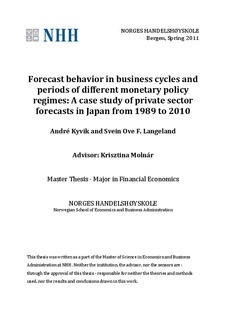Forecast behavior in business cycles and periods of different monetary policy regimes: a case study of private sector forecasts in Japan from 1989 to 2010
Master thesis
Permanent lenke
http://hdl.handle.net/11250/168997Utgivelsesdato
2011Metadata
Vis full innførselSamlinger
- Master Thesis [4372]
Sammendrag
Does forecast behavior differ in business cycles and periods of different monetary policy regimes? This paper explores private sector expert forecasts in Japan from 1989 to 2010 to answer this question. The case study suggests six broad lessons. First, private sector expectations are irrational in contractions and expansions even though they are rational in the full sample. Second, consensus forecasts are more accurate than forecasts based on theoretical models. Third, forecast accuracy differs among macroeconomic variables and is higher in expansions than in contractions. Fourth, experts are not able to predict crises or turning points in the economy. Fifth, the critique of the Bank of Japan doing too little to fight deflation in the 1990s seems harsh. And sixth, the Bank of Japan’s credibility may have been hurt by twice leaving their zero interest rate policy too early.
